by Kate Narita, introduction by Melissa Stewart 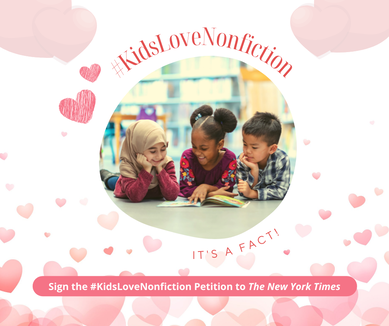
In February, CLA members Mary Ann Cappiello, Professor of Language and Literacy at Lesley University and Xenia Hadjioannou, Associate Professor of Language and Literacy Education at Penn State University, sent a letter signed by more than 500 educators to The New York Times asking the paper to add children's nonfiction bestseller lists to parallel the current fiction-focused lists.
The letter was also published on more than 20 blogs that serve the children's literature community--including this one—and amplified on social media as part of the #KidsLoveNonfiction campaign. (To date, more than 2,100 people have signed it.) A few weeks later, The New York Times responded, saying it had no current plans to add nonfiction lists at this time. Many people were disappointed by this decision, including fourth-grade teacher and CLA member Kate Narita, who has written the following essay, bravely sharing how the petition changed her thinking. -- Melissa Strewart Shattering My Implicit Bias Against Nonfiction by Kate Narita
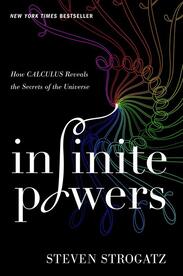 Then, in January, my son mentioned a book he had read, Infinite Powers: How Calculus Reveals the Secrets of the Universe by Steven Strogatz. “Oh,” I said. “Sounds interesting. Did you read it for your calculus class?” “Yes,” he said. “And I really enjoyed it.” Did his statement about enjoying a book wake me up to my implicit bias? No. But I did feel a shift inside me. I was pleasantly surprised and excited because I love talking about books. If he had read something and was excited about it, I could read it and discuss it with him, even if he had only read it because it was a class assignment. Here was a way I could deepen my relationship with him as an adult. Even if it was just a one-time occurrence. I asked if I could read the book when he was done, and he brought it home the next time he visited. Fast forward to February break. As my husband and I were packing for a trip to Maui to celebrate our 25th wedding anniversary, he spotted Infinite Powers in the pile of books I was sorting through on our ottoman and picked it up. “What’s this?” he asked. When I explained, he asked if he could take it to Hawaii, and I nodded. I hadn’t read it yet because, to be honest, reading a whole book about calculus felt too daunting. Instead, I packed and read three books from Kate Messner’s History Smashers series and Rukhsanna Guidroz’s Samira Surfs. I also spotted a copy of Kristin Hannah’s Fly Away in our condo. Since I had watched Hannah’s Firefly Lane on Netflix and was listening to The Four Winds on Libby, I couldn’t resist picking up Fly Away, and I devoured it in a day. As my husband and I sat side-by-side reading on the beach, we talked about Infinite Powers. He told me that while he was enjoying the book, the author gave way too much credit to calculus and not nearly enough to physics. He was kind of cranky about it. Actually, he was truly irritated. I was surprised that he was having an emotional response to the book, a nonfiction book. It had stirred up passion inside him, even though it wasn’t a novel. Did his passion wake me up to my implicit bias? Not yet. But I did feel another shift. He was expressing emotion about a book, and I was listening. In the past, it had almost always been me expressing emotion about a novel and him listening. 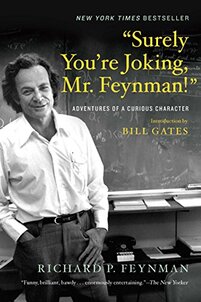 In our almost thirty-year relationship, I could only think of one other time when he had emoted about a book. It was Surely You’re Joking, Mr. Feynman! by Richard Feynman, which I read because he had read it multiple times and was so excited about it. When we got back home, I spotted this petition (which you can still sign) on Twitter. Two professors of literacy, Mary Ann Cappiello and Xenia Hadjioannou, had written a letter asking The New York Times to add three children’s nonfiction bestseller lists—one for picture books, one for middle grade, and one for young adults. I signed it because, of course, I fully supported nonfiction writers and readers! A couple of weeks later, I saw on Facebook that, even though more than 2,000 people had signed the petition, The New York Times had refused to add children’s nonfiction bestseller lists. After a full day of teaching, I was tired, and reading this unfortunate news made me angry. I looked up from my phone. Across the room, my younger son, who was home on spring break, was reading The Elegant Universe: Superstrings, Hidden Dimensions, and the Quest for the Ultimate Theory by Brian Greene for fun because he had liked Infinite Powers so much and wanted to keep reading and learning. Next to him, my husband was reading an article about the Green Bay Packers on the internet. 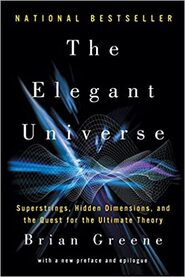 In that instant, a lightbulb clicked on in my mind, and an awareness of my implicit bias washed over me like a tidal wave. My husband and younger son are readers. They have always been readers. I just didn’t realize it because narratives and fiction aren’t their jam. But give them nonfiction on topics they find fascinating—math, physics, sports—and they’re all in. They’re curious people who read to learn. They want to know about the world, how it works, and their place in it. The decisionmakers at The New York Times seem to have their own implicit bias against children’s nonfiction, and as long as they do not include lists highlighting these books, they’re failing to acknowledge the 42 percent of our youth who crave true texts. They’re also failing to open the eyes of adults who raise those kids, thinking they’re not readers. Maybe we should petition The Wall Street Journal next.
Comments are closed.
|
Authors:
|
CLA
About CLA
|
Journal of Children's Literature
Write for JCL
|
ResourcesCLA-sponsored NCTE Position Statements
|
Members-Only Content
CLA Video Library
|
© COPYRIGHT 2018.
ALL RIGHTS RESERVED |

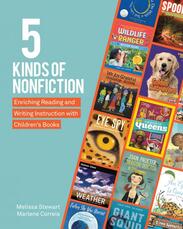
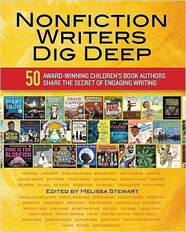


 RSS Feed
RSS Feed